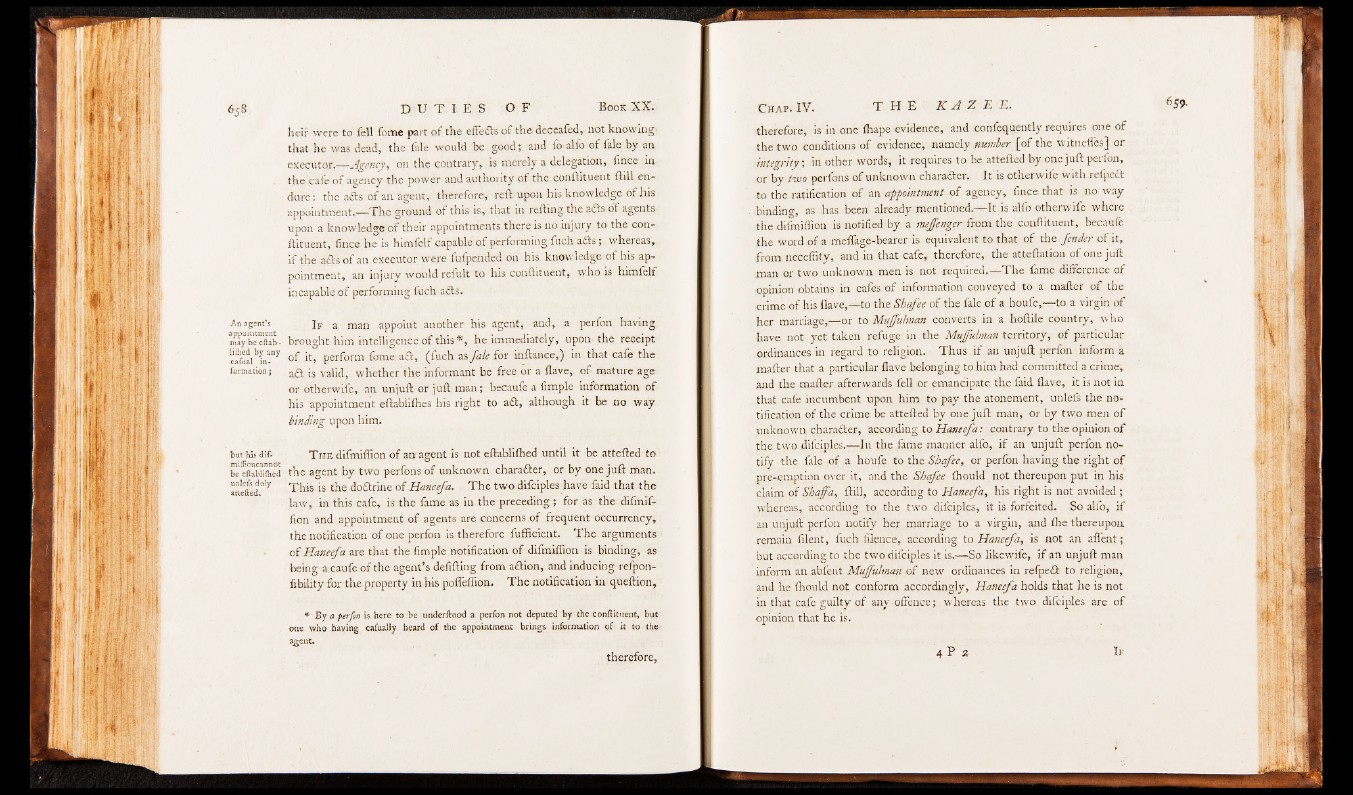
An agent’s
appointment
may be eftab -
lifhed by any
cafual information
;
but his dif-
miflsoncannot
be èftablifhed
unlefs duly
attefted.
heir were to fell fome part of the effedts of the- deceafed, not knowing*
that he Was dead, the fale would be good; and fo'alfo of fale by1 an
executor.— Agency, on the contrary, is merely a delegation, lince in
the cafe of agency the power and authority of the conftituent ftill endure:
the adts of an agent, therefore, reft upon his knowledge of his
appointment.— The ground of this is, that in reftmg the adts of agents
upon a knowledge of their appointments there is no injuiy to the con-
ftituent, flnce he is himfelf capable'of performing fuch adts; whereas,
if the adts of an executor were fufpended on his. knowledge of his appointment,
an injury would refult to his conftituent, who is himfelf
incapable of performing inch adts.
If a man appoint another his agent, and, a perfon having
brought him intelligence of this * , he immediately, upon the receipt
of it, perform fome adt, (fuch as fale for inftance,) in that cafe the
aft is valid, whether the informant be free or a (lave, of mature age
or otherwife, an unjuft or juft man; becaufe a Ample information of
his appointment eftablifhes his right to adt, although it be no way
binding upon him.
T h e difmiflion of an agent is not eftablifhed until it be attefted to
the agent by two perfons of unknown charadter, or by one juft man.
This is the dodtrine of Haneefa. The two difciples have faid that the
law, in this cafe, is the fame as in the preceding; for as the difmif-
fion and appointment of agents are concerns of frequent occurrency,
the notification of one perfon is therefore fufficient. The arguments
of Haneefa are that the ftmple notification of difmiflion is binding, as
being a caufe of the agent’s defifting from adtion, and inducing refpon-
fibility for the property in his pofleflion. The notification in queftion,
* B y a perfon is. here to be underftood a perfon not deputed by the conftituent, but
one who having cafually heard o f the appointment brings information o f it to the
agent.
therefore,
therefore, is in one fhape evidence, and confequently requires one of
the two conditions of evidence, namely number [of the witnefles] or
integrity, in other words, it requires to be attefted by one juft perfon,
or by two perfons of unknown character. It is otherwife with .refpedt
,to the ratification of an appointment of agency, fince that is no way
hindino-, as has been already mentioned.— It is alfo otherwife where
the difmiflion is notified by a meffenger from the conftituent, becaufe
the word of a meflage-bearer is equivalent to that of the fender of it,
from neceffity, and in that cafe, therefore, the atteftation of one juft
man or two unknown men is not required.— The fame difference of
opinion obtains in cafes of information conveyed to a mafter of the
crime of his {lave,— to the Shafee of the fale of a houfe,— to a virgin of
her marriage,— or to Mujfulman converts in a hoftile country, who
have not yet taken refuge in the Mujfulman territory, of particular
ordinances in regard to religion. Thus if an unjuft perfon inform a
maftpr that a particular Have belonging to him had committed a crime}
and the mafter afterwards fell or emancipate the faid Have, it is not in.
that cafe incumbent upon him to pay the atonement, unlefs the no*-
tification of the crime be attefted by one juft man, or by two men of
unknown charadter, according to Haneefa: contrary to the opinion of
the two difciples.— In the fame manner alfo, if an unjuft perfon notify
"the fale of a houfe to the Shafee, or perfon having the right of
pre-emption over it, and the Shafee fhould not thereupon put in his
claim of Shaffa, ftill, according to Haneefa, his right is not avoided ;
whereas, according to the two difciples, it is forfeited. So alfo, if
an'unjuft perfon notify her marriage to a virgin, and fhe thereupon
remain filent, fuch filence, according to Haneefa, is not an aflent;
but according to the two difciples it is.— So likewife, if an unjuft man
inform an abfent Muffulman of new ordinances in refpect to religion,
and he fhould not conform accordingly, Haneefa holds that he is not
in that cafe guilty of any offence; whereas the two difciples are of
opinion that he is.
4 P 2 Ik